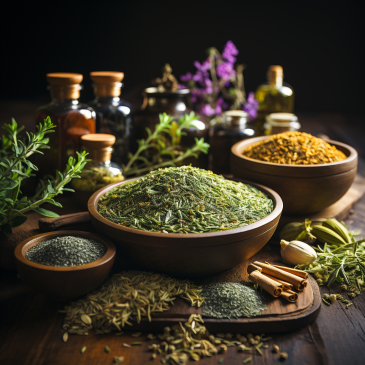
In today's fast-paced world, stress, anxiety, and low moods are frequent visitors. Amidst the hustle and bustle, maintaining a sense of happiness and calm can sometimes seem like an elusive goal. However, Ayurveda, an age-old system of medicine, provides natural solutions using herbs and plants, enhancing our mood and promoting overall well-being.
The Ayurvedic Philosophy
Originating from India over 5000 years ago, Ayurveda, meaning the 'science of life,' emphasizes a holistic approach to health. It insists on maintaining balance in all aspects of life, from diet and sleep to emotional and mental states.
Ayurveda believes that good health results from a balance in the three doshas or life energies – Vata, Pitta, and Kapha. An imbalance in these doshas is seen as the root cause of illnesses, including mental health disorders.
Mood-Boosting Ayurvedic Herbs
Ayurveda has a rich repository of herbs known for their mood-enhancing properties. Let's explore some of these potent herbs and their potential to uplift mood and support mental well-being.
1. Ashwagandha (Withania somnifera)
Often referred to as 'Indian ginseng,' Ashwagandha is an adaptogen that helps the body manage stress. It can reduce anxiety and foster a sense of calm. However, in rare cases, it may lead to mild side effects like headache, sleepiness, and stomach upset.
2. Brahmi (Bacopa monnieri)
Brahmi is renowned for its cognitive-enhancing benefits. It aids in improving memory and cognitive function and promoting relaxation. It's generally safe, but some people may experience nausea, dry mouth, or fatigue.
3. Tulsi (Ocimum sanctum)
Also known as 'holy basil,' Tulsi combats stress and anxiety. Regular consumption of tulsi tea or extracts can foster mental clarity. Mild side effects like nausea or diarrhea might occur when consumed in excess.
4. Saffron (Crocus sativus)
Although primarily a spice, saffron is also valued in Ayurveda for its mood-boosting properties. While generally safe for most people, high doses can cause allergic reactions, dizziness, or dry mouth.
5. Shankhpushpi (Convolvulus pluricaulis)
Shankhpushpi is used to enhance memory and intellectual capacity. It also helps manage stress and anxiety. However, overconsumption might lead to mild side effects like headache or drowsiness.
Incorporating Ayurvedic Herbs in Your Routine
Before incorporating these herbs into your routine, consult with an Ayurvedic practitioner or healthcare professional. They can guide you on the right herbs and dosages as per your specific needs.
While these herbs can support mood enhancement, Ayurveda emphasizes a balanced lifestyle. Regular exercise, a healthy diet, adequate sleep, mindfulness practices, and nurturing social relationships are vital for maintaining a positive mental state.
Conclusion
Ayurveda provides a holistic approach to happiness, promoting the idea that our well-being extends beyond physical health to encompass emotional and spiritual health. By incorporating Ayurvedic herbs and principles into your life, you can take a powerful step towards a happier, healthier, and more balanced life. However, it's crucial to understand potential side effects and consult a professional for personalized advice.
